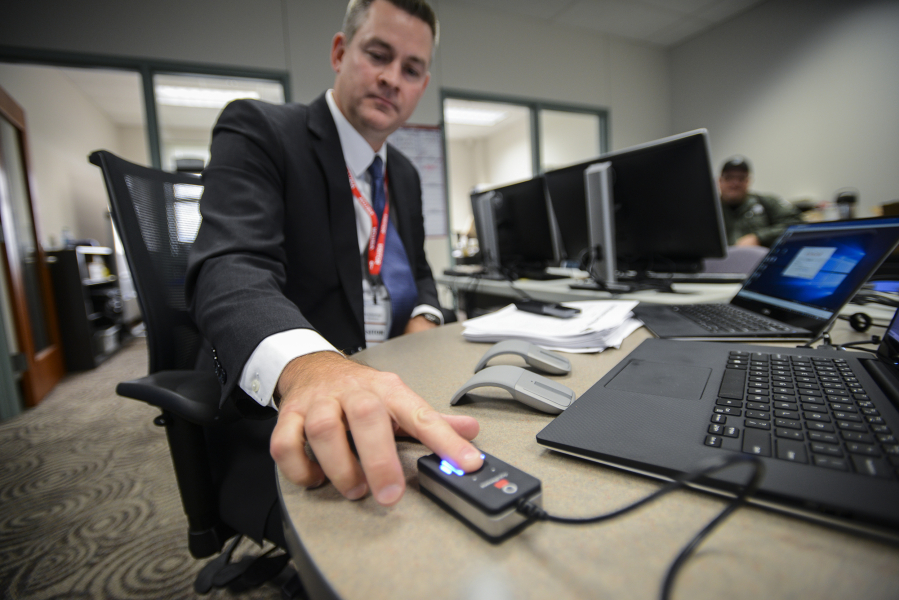The Clark County Jail will enroll all newly booked inmates into an internal fingerprint database to better track who’s coming in. Perhaps more importantly, on the heels of an escape where inmates switched identities, it will also track who’s going out.
The new biometric registry will augment the jail’s current procedures for tracking and identifying inmates, jail Chief Ric Bishop said at a training session for corrections deputies on the new system Tuesday. They will begin using the system this week.
The tool, a fingerprint scanner and associated database, combined with documents and photos, will help corrections deputies better track inmates, he said, and prevent mistakes.
“You can verify who they are and we’ll enroll them so that if they come back, when they come in the door, finger goes on the capture device, and we’ll know right away who they are,” he told jail staff.
The new system was already on order when a man was accused of switching identities with another inmate and walking out of jail.
On May 12, Michael Diontae Johnson, 30, allegedly swapped clothes, ID bracelets and cells with LaQuon Carson Boggs, 19, who was scheduled to be released that day.
Court records say Johnson signed Boggs’ name on paperwork and recited Boggs’ birthdate before walking out of the jail that morning. Jail staff discovered Johnson was gone during a lunch hour headcount.
U.S. Marshals caught up with and arrested Johnson in early June in Illinois.
Johnson was serving a 24-year prison sentence in Arizona for kidnapping and aggravated assault. He was in Clark County to stand trial for a 2014 domestic violence case. Bishop said the internal investigation into the escape should be completed and available next week.
A new system
Until now, custody officers used photos, documents, physical descriptions and other means to identify inmates as they entered the jail. When prisoners are due for release, officers make sure the exit information matches the entry information.
The new biometric system would have prevented May’s alleged escape, Bishop said.
“His fingerprint would not have matched the other gentleman’s fingerprint, and that would have stopped him.”
All new inmates already have their fingerprints taken. That information goes to the state and FBI. While it’s still available, it’s not as accessible to corrections staff as it will be through the new database.
“It’s a local repository. It’s not meant to replace or compete with the national or state one,” said Justin Davis, the vice president of development at Executive Information Systems, the system vendor. Bishop said there are no plans to share the database outside of the county.
Similar systems are in place in other jails, but Bishop thinks Clark County’s is the first installation in Washington. The database and finger scanners cost the county $40,000, he said, and were budgeted as part of the sheriff’s computer equipment needs.
Using the fingerprint system is “extremely important for public safety. We do not want to release anyone incorrectly,” he said.
The sheriff’s office has talked about expanding the system to other functions, even patrol, but it’s preliminary, he said.
“This is a local database of fingerprints, and occasionally, patrol deputies will run into people who don’t always identify themselves, or don’t always correctly identify themselves,” Bishop said. “If the capture station is available in the patrol car, the fingerprint can be captured, and bounced off the local database.”
After training staff, the jail’s next step will be adding fingerprints to build the database.
The jail books about 44 people per day, and releases about the same, Bishop said. Most inmates are in the jail for less than 30 days, so after about a month, 90 percent of the current jail population will have their fingerprints in the database.
After that, corrections deputies will fingerprint the remaining inmates, those with longer stays.
“Five weeks from now, everyone in the jail will be enrolled in the system,” Bishop said.
Around 668 people were being held in the jail Tuesday, he said.
Boggs was released as scheduled, and no charges have been filed against him. Johnson faces additional charges of escape. He is expected in court today to plead guilty to those charges, as well as the domestic violence charge, court documents say.




